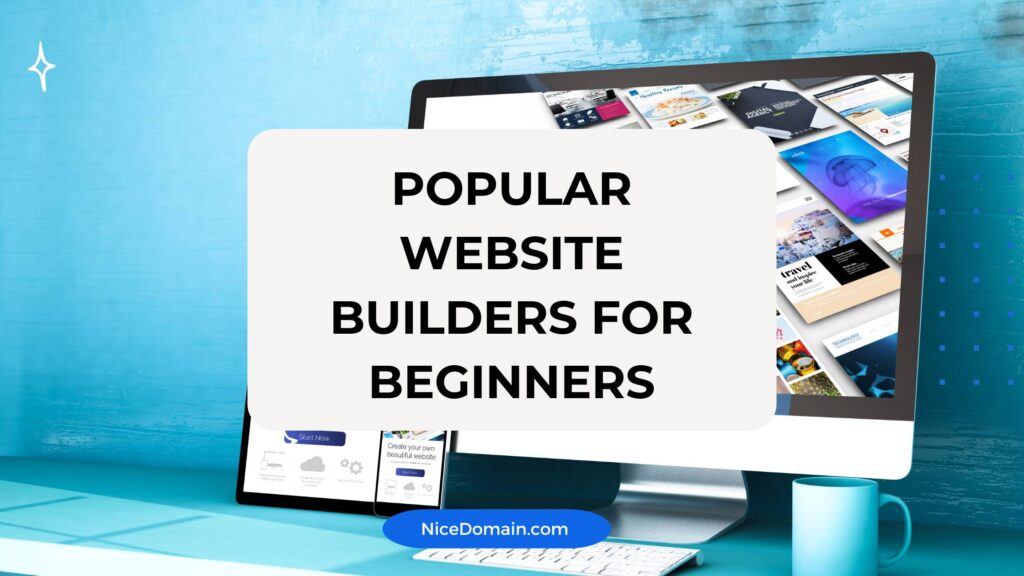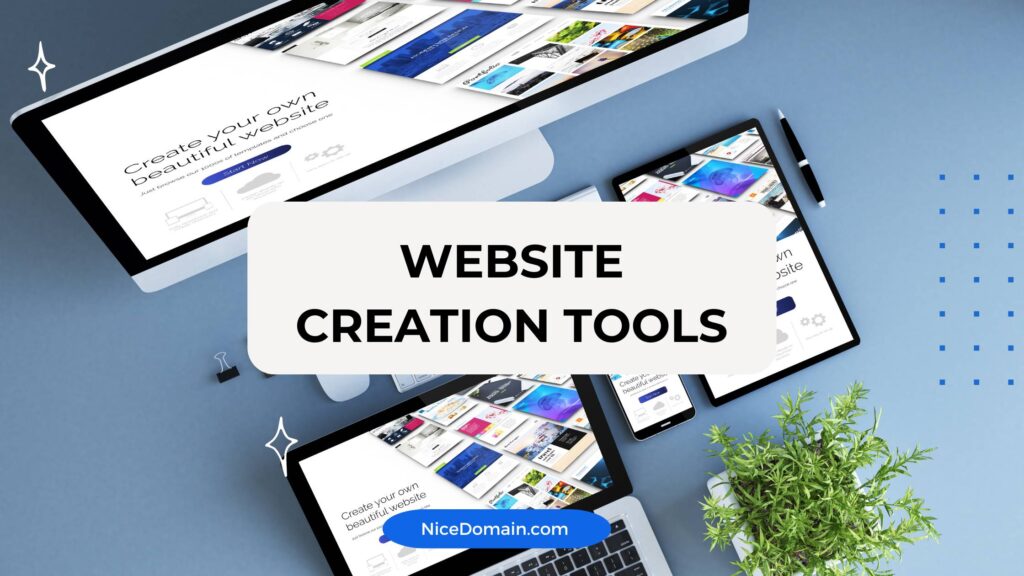In today’s digital landscape, establishing an online presence is essential for individuals and businesses alike. For beginners, the prospect of creating a website can seem daunting, especially when faced with technical jargon and complex coding languages. Fortunately, the advent of website builders has revolutionized the process, making it accessible to users with minimal technical expertise. These intuitive platforms offer a range of customizable templates, drag-and-drop functionalities, and integrated tools that enable users to design visually appealing and functional websites without the need for extensive training. In this article, we will explore some of the most popular website builders available today, examining their features, ease of use, and pricing options. Whether you are looking to launch a personal blog, an online portfolio, or a small business site, these platforms cater to diverse needs and skill levels, empowering users to create professional-looking websites effortlessly. By highlighting the strengths and weaknesses of each builder, this guide aims to equip beginners with the knowledge necessary to make informed decisions and successfully embark on their web development journey. Join us as we delve into the world of website builders and discover the tools that can transform your online vision into reality.
Wix offers easy drag-and-drop functionality.
The intuitive design interface allows users to create visually appealing websites without needing extensive technical knowledge. By simply dragging elements such as text boxes, images, and buttons into the desired position on the page, users can customize their site in real time. This seamless interaction not only saves time but also empowers individuals to experiment with layout and design freely, fostering creativity and innovation.
Furthermore, the flexibility of the drag-and-drop system means that adjustments can be made quickly and easily, enabling users to see how changes impact the overall look and feel of their site instantly. This dynamic approach to website creation is particularly beneficial for small business owners and entrepreneurs who may need to update their content frequently or adapt their online presence to reflect changing priorities. The ease of use significantly lowers the barrier to entry, making it possible for anyone to launch a professional-looking website with minimal effort.
Squarespace provides beautiful templates for beginners.
The extensive library of visually striking templates caters to a wide array of industries and personal styles, ensuring that users can find a design that resonates with their brand identity. Each template is meticulously crafted to provide an aesthetic appeal that is both modern and professional, allowing users to establish a strong online presence from the outset. The templates are fully responsive, meaning they automatically adjust to look great on any device, which is crucial in today’s mobile-first world.
Additionally, these templates are equipped with customizable features that allow users to tweak colors, fonts, and layouts with ease. This level of adaptability ensures that while beginners can leverage expertly designed aesthetics, they still have the freedom to infuse their unique vision into the final product. The combination of beautiful design and user-friendly customization tools makes it simple for anyone to create a standout website that captures attention and engages visitors effectively.
WordPress.org allows extensive customizations and plugins.
The platform is recognized for its high degree of customization, empowering users to tailor their websites to meet specific needs and preferences. With a robust selection of themes and an extensive library of plugins, individuals can easily enhance functionality and design elements. From e-commerce solutions to SEO optimization tools, these plugins enable users to integrate advanced features without requiring extensive technical knowledge, making it accessible for both novices and experienced developers alike.
Moreover, the open-source nature of WordPress.org allows for infinite possibilities in terms of personalization. Developers can modify existing themes or create entirely new ones, ensuring that the end product aligns perfectly with the user’s vision. This flexibility fosters creativity, enabling users to build unique websites that stand out in a competitive digital landscape. With ongoing community support and regular updates, WordPress.org continues to evolve, providing an ever-expanding array of options for customization and functionality.
Weebly is user-friendly and intuitive.
The interface of this platform ensures that users, regardless of their technical expertise, can navigate its features with ease. Drag-and-drop functionality simplifies the process of adding content, allowing individuals to seamlessly arrange elements on their pages without the need for coding. This intuitive design not only saves time but also reduces the learning curve, enabling users to focus on creativity and content rather than grappling with complex website-building processes.
In addition to its ease of use, the platform offers a variety of guided tutorials and resources that further enhance the user experience. These supportive tools empower users to make informed decisions while designing their sites, ensuring that they can achieve professional results with minimal effort. The commitment to user experience is evident in every aspect of the platform, making it a go-to solution for anyone looking to establish an online presence quickly and effectively.
Shopify specializes in e-commerce website creation.
This platform provides comprehensive solutions tailored specifically for businesses seeking to establish a robust online storefront. It offers a variety of customizable templates designed to enhance the shopping experience, enabling merchants to showcase their products effectively while maintaining brand consistency. With features such as inventory management, payment processing, and customer relationship management, it empowers users to handle all aspects of their online retail operations from a single interface.
Furthermore, the platform’s scalability ensures that businesses can grow without facing significant hurdles. As a merchant’s needs evolve, they can easily integrate additional functionalities, such as advanced analytics and marketing tools. This adaptability makes it an ideal choice for both small startups looking to make their mark and larger enterprises aiming to optimize their e-commerce strategies. By streamlining the complexities of online sales, it allows entrepreneurs to focus on driving growth and enhancing customer engagement.
Webflow combines design and development tools.
offers a seamless integration of design and development capabilities that appeal to both creatives and technical users. This innovative platform empowers designers to craft visually stunning websites without sacrificing functionality, thanks to its intuitive drag-and-drop interface. Users can manipulate elements with ease while leveraging powerful features like responsive design and custom animations, ensuring that their sites not only look great but also perform optimally across devices.
Additionally, the integration of coding capabilities allows developers to fine-tune their projects, giving them the freedom to implement complex interactions or customize components as needed. This dual approach fosters collaboration between teams, bridging the gap between design vision and technical execution. As a result, Webflow stands out as an effective solution for those seeking to build sophisticated websites while maintaining full creative control, making it a valuable asset in the toolkit of modern web design and development.
Jimdo simplifies website creation with AI.
The innovative platform enhances the website creation process by harnessing advanced artificial intelligence to streamline design and content generation. Users can benefit from automated suggestions that guide them through layout choices and content optimizations, significantly reducing the time and effort typically required for website setup. This AI-driven approach not only simplifies the development process but also empowers individuals with limited technical expertise to create professional-looking websites that are tailored to their specific needs.
Moreover, the platform’s user-friendly interface allows for easy customization, enabling users to modify templates and incorporate branding elements seamlessly. The combination of AI assistance and intuitive design tools provides a comprehensive solution that caters to various user profiles, from small business owners to freelancers, who seek an efficient means to establish their online presence without compromising on quality or design. This capability positions the platform as a noteworthy choice for those navigating the digital landscape.
GoDaddy offers quick website setup options.
an aesthetic appeal. With a wide range of pre-designed templates and an intuitive drag-and-drop editor, individuals can launch their websites rapidly, making it an excellent choice for those with tight deadlines or limited experience in web development. The step-by-step guidance provided throughout the setup process helps demystify web design, allowing users to focus on their content and objectives rather than technical complexities.
In addition to the quick setup features, the platform integrates essential tools for search engine optimization and e-commerce, making it a versatile option for various business needs. Users can easily add functionality such as online payment options or contact forms, further enhancing their website’s utility. This seamless integration of vital components empowers users to create comprehensive online experiences that not only look professional but also drive engagement and conversions.
SiteGround provides reliable hosting solutions.
A robust hosting infrastructure is crucial for ensuring website performance, security, and uptime, which are essential factors for any successful online venture. SiteGround excels in these areas, offering a range of hosting plans designed to meet the needs of individuals and businesses alike. With advanced technologies, such as SSD storage and custom caching, users can expect swift loading times and a smooth browsing experience for their visitors. Furthermore, SiteGround’s commitment to security is evident through their proactive monitoring, daily backups, and free SSL certificates, which collectively contribute to the protection of websites against potential threats.
Customer support is another hallmark of SiteGround’s service, with a team of knowledgeable experts available 24/7 to assist users with any technical inquiries or issues. This level of support equips users with the confidence to manage and scale their websites effectively, regardless of their technical expertise. The combination of reliable performance, robust security measures, and dedicated customer assistance makes SiteGround a top choice for those seeking dependable hosting solutions, ultimately allowing users to focus on growing their online presence without the worry of technical disruptions.
Strikingly enables one-page website building easily.
The platform offers an intuitive drag-and-drop interface, allowing users to construct visually appealing websites with minimal effort. Through a selection of professionally designed templates, individuals can quickly customize their site to reflect their brand identity, ensuring a cohesive look and feel. The streamlined process not only saves time but also eliminates the need for extensive technical knowledge, making it accessible for users from all backgrounds.
In addition to its ease of use, the platform incorporates essential features such as responsive design and built-in SEO tools, which enhance visibility and user experience across devices. This combination of simplicity and functionality empowers users to focus on content creation and audience engagement, rather than getting bogged down by complex web development tasks. As a result, it serves as an ideal solution for entrepreneurs, freelancers, and small businesses looking to establish a strong online presence quickly and efficiently.
In conclusion, choosing the right website builder is a crucial step for beginners looking to establish their online presence. With a variety of user-friendly options available, such as Wix, Squarespace, and WordPress, aspiring webmasters can find a platform that suits their specific needs and skill levels. These tools not only simplify the website creation process but also offer essential features like customizable templates, e-commerce capabilities, and SEO tools to enhance visibility. By considering factors such as ease of use, design flexibility, and customer support, beginners can confidently select a website builder that empowers them to bring their ideas to life and effectively engage their target audience. As the digital landscape continues to evolve, leveraging these platforms will undoubtedly set the foundation for successful online ventures.
FAQ
Here are five questions related to popular website builders for beginners:
- What are popular website builders for beginners?
- Wix, Squarespace, Weebly, WordPress.com, and Shopify are user-friendly options.
- Are these builders free?
- Most offer free plans with limitations; premium plans provide more features.
- Can I customize my website?
- Yes, all allow customization with templates, themes, and design tools.
- Is it easy to use?
- Yes, they are designed for non-technical users with drag-and-drop interfaces.
- Do they offer e-commerce features?
- Yes, platforms like Shopify and Wix support online stores and payment processing.
What features should beginners look for when choosing a website builder?
Beginners should look for website builders that offer user-friendly interfaces, drag-and-drop functionality, and customizable templates. Key features include responsive design for mobile compatibility, reliable customer support, and easy integration with third-party tools like social media and e-commerce platforms. Additionally, consider options for SEO optimization, available storage and bandwidth, and pricing plans that suit your budget. A trial period can also be beneficial for testing the platform before committing.
How do popular website builders like Wix, Squarespace, and WordPress compare in terms of ease of use for beginners?
Wix is the most user-friendly, featuring a drag-and-drop interface that allows beginners to create websites quickly without coding. Squarespace offers a slightly steeper learning curve but provides beautiful templates and design flexibility, ideal for those focused on aesthetics. WordPress, while powerful and customizable, can be challenging for beginners due to its complexity and the need for some technical skills, especially when using plugins and themes. Overall, Wix is best for absolute beginners, Squarespace suits design-focused users, and WordPress is better for those willing to invest time in learning.
What are the pros and cons of using a drag-and-drop website builder for someone with no coding experience?
Pros of using a drag-and-drop website builder include ease of use, allowing individuals with no coding experience to create websites quickly and visually. They often come with pre-designed templates, integrated tools, and responsive design options. Cons include limited customization options, potential performance issues, and reliance on the platform’s features and pricing plans. Users may also face challenges with SEO and scalability as their needs grow. Overall, while these builders are user-friendly, they may not offer the flexibility or advanced functionality that more experienced users or growing businesses might require.
Can beginners create an e-commerce website using popular website builders, and if so, what specific tools or features should they consider?
Yes, beginners can create an e-commerce website using popular website builders like Shopify, Wix, or Squarespace. Key tools and features to consider include user-friendly drag-and-drop interfaces, customizable templates, secure payment gateways, inventory management systems, and mobile responsiveness. Additionally, look for SEO optimization tools, integrated analytics for tracking sales, and customer support options. These features help streamline the setup process and enhance the overall shopping experience for users.
How can beginners optimize their websites for search engines using the tools provided by popular website builders?
Beginners can optimize their websites for search engines by using built-in tools provided by popular website builders like Wix, Squarespace, or WordPress. Start by selecting SEO-friendly templates and customizing meta titles and descriptions for each page. Utilize keyword research tools to identify relevant keywords and incorporate them naturally in content. Leverage features like alt text for images and ensure fast loading times by optimizing images. Use the integrated analytics tools to monitor traffic and adjust strategies accordingly. Additionally, submit the site to search engines and create a sitemap to enhance indexing.



